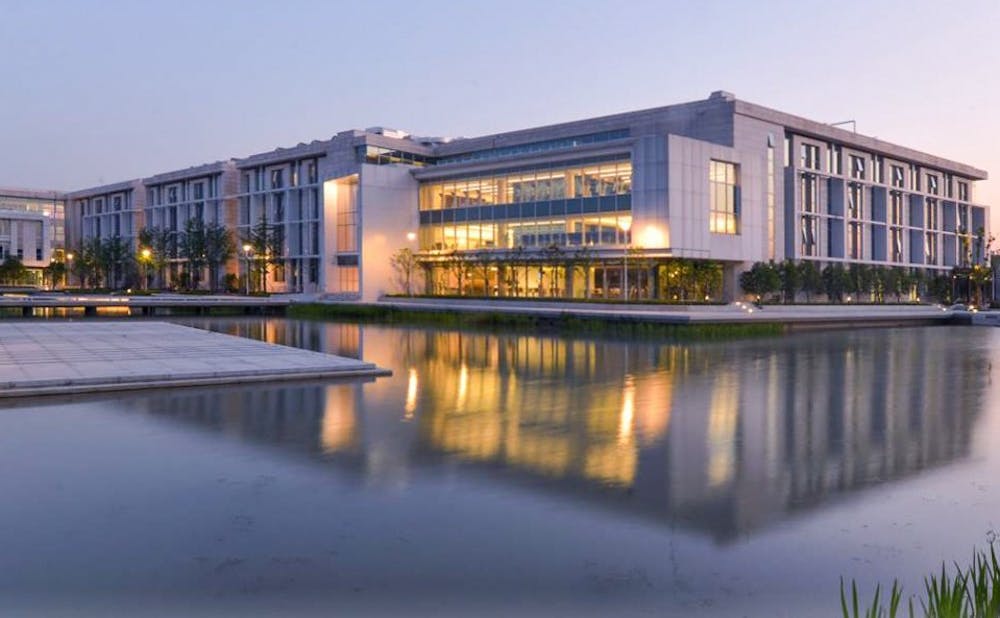Spread throughout a second-floor Perkins meeting room, about 20 professors listened to a presentation about a new major called Ethics and Leadership.
When Emily McWilliams teaches the first course in the major—also called Ethics and Leadership—it won’t be in Durham. McWilliams is an assistant professor of humanities at Duke Kunshan University, and the program of study she helped design is one of several interdisciplinary majors being offered to DKU’s first undergraduate class.
“I think it’s a really unique opportunity—both pedagogically and in terms of forwarding my own research,” McWilliams said. “On the teaching side, being able to be involved with something like this on the ground floor and actually shape what it looks like rather than being slotted into an existing institution, which is kind of the structure of all the other job options I have, this is much more exciting and much more meaningful.
As Duke Kunshan University gears up to bring in undergraduates for the first time this Fall, the school’s new faculty spent some time in Durham getting to know each other and building the framework for the undergraduate program in their second on-campus residency this semester.
The first in-person Design Institute in February lasted three days. This one started March 19 and wraps up March 23—both are part of a six-month long Learning Innovation Fellowship with online and in-person components, wrote Noah Pickus, dean of undergraduate curricular affairs and faculty development at DKU, in an email.
McWilliams noted that one key benefit of stepping in to DKU at this stage was the chance to think critically about what the new school can look like and to shape its direction.
“We get to talk really intentionally about what we want a liberal arts education to be, rather than taking for granted what it is,” she said.
The DKU undergraduate degree program has been in the works since it was given the final nod of approval from Duke’s Academic Council and Board of Trustees in late 2016. Since then, they’ve hired the 22 faculty members and gotten majors approved by China’s Ministry of Education in preparation for the first cohort of students to arrive in Fall 2018.
This week-long residency gave faculty the chance to collaborate on syllabus designs and discuss the majors they’ve created, including Global China Studies/History, Materials Science/Physics and Global Health/Public Policy. In total, 15 majors have been approved by the Chinese Ministry of Education so far.
“We’re getting down to do the nuts and bolts of developing courses and majors,” said Scott MacEachern, professor of social science at DKU. “You can do that stuff over email and through Sakai, but fundamentally you need to sit down and talk to each other.”
MacEachern—an archaeologist who studies Africa—is leaving Bowdoin College for DKU after 23 years of teaching at the liberal arts college.
One of the motivating factors in making the move for MacEachern was the chance to try something different at the school, where he’ll be one of the inaugural faculty members.
He’ll be moving over to China in mid-July, and he’s starting to deal with the logistical factors of moving halfway across the world as an established academic.
“One of the things that I have at Bowdoin is an office that is filled with books,” he said. “So what exactly happens to those books? Because I’m sure not about to take them all over to China.”
Some of the new DKU faculty have experience working in similar environments. Qian Zhu, assistant professor of humanities at DKU, previously taught at New York University Shanghai and is excited about the chance to be part of building the university from the ground up.
Zhu said she was interested in joining the DKU faculty because her experience at NYU Shanghai instilled in her an appreciation for a global campus and her research is on modern Chinese history, meaning all the archives she needs access to are in China.
“In that sense, this is the perfect job for me,” she said. “And also, equally important, Gao Haiyan, the vice chancellor at DKU, is very supportive of women faculty both in the recruiting process and in the mentoring period right now.”
In her presentation about the Global China Studies major, Zhu discussed the program’s ten-year goal, which include expanding into more diverse tracks beyond the history one they are starting with and growing towards a more global take on the topic.
As part of the week-long residency at Duke, the DKU faculty discussed syllabi, rubrics and larger scale topics like their majors, as well as met with relevant Duke faculty. MacEachern noted that this session gave the faculty the chance to fine tune their pedagogical approaches and nail down the fine-grained logistics, like what software will be on their computers.
For Peter Pickl, a professor of science at DKU who currently teaches at Ludwig Maximilian University of Munich, interdisciplinary collaboration with the other cohort’s members has been an important aspect of the on-campus program.
Get The Chronicle straight to your inbox
Sign up for our weekly newsletter. Cancel at any time.
With an academic background in mathematics and physics, Pickl views interdisciplinary science as a key part of the DKU model.
“I have more exchange here with colleagues from say religious studies than I do at home with colleagues from algebra, which is also math,” he said.
For Pickl, the reality of being an inaugural faculty member for DKU’s undergraduate program will soon be a reality—he’s moving over to China in two weeks.
“I’m really excited now, and it feels more and more real when I meet the colleagues here and think about moving there,” he said. “It’s awesome.”
Bre is a senior political science major from South Carolina, and she is the current video editor, special projects editor and recruitment chair for The Chronicle. She is also an associate photography editor and an investigations editor. Previously, she was the editor-in-chief and local and national news department head.
Twitter: @brebradham
Email: breanna.bradham@duke.edu

